Are you wondering if Dawn dish soap is eco-friendly? Look no further! This article examines the environmental impact of Dawn dish soap, including its ingredients and packaging. We’ll delve into its biodegradability and potential water pollution, as well as its effect on wildlife and ecosystems. Additionally, we’ll explore Dawn’s sustainability initiatives and certifications. By comparing it to other eco-friendly dish soaps, we’ll help you make an informed decision. Stay tuned for tips and alternatives for a more environmentally conscious approach to dishwashing.
Environmental Impact of Dawn Dish Soap
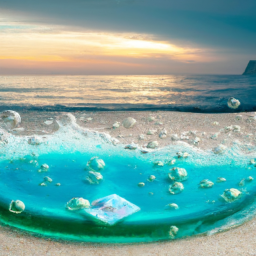
Did you know that using Dawn dish soap has a significant environmental impact? The ingredients in Dawn dish soap, such as surfactants and preservatives, can have adverse effects on aquatic life. Surfactants, like sodium lauryl sulfate, can disrupt the natural surface tension of water, making it difficult for fish and other aquatic organisms to breathe. Additionally, preservatives like methylisothiazolinone can be toxic to aquatic animals.
Comparing Dawn dish soap with other eco-friendly dish soaps reveals some notable differences. Eco-friendly alternatives often use plant-based ingredients that are biodegradable and less harmful to the environment. These soaps may contain substances like coconut oil or citric acid that effectively remove grease without causing harm to aquatic ecosystems.
Some eco-friendly dish soaps also come in packaging made from recycled materials or are refillable to reduce waste. By choosing these options over Dawn dish soap, you can significantly reduce your environmental impact.
Ingredients in Dawn Dish Soap and Their Environmental Effects
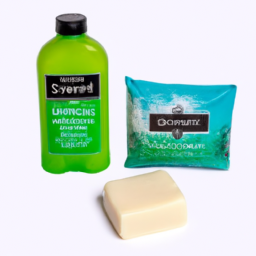
The ingredients in Dawn dish soap can have environmental effects. When considering the environmental impact of a product, it is important to examine its ingredients. Dawn dish soap contains several key ingredients that can potentially harm the environment.
One such ingredient is sodium laureth sulfate (SLES), which is used as a surfactant to help break up grease and oil. While effective at cleaning dishes, SLES has been found to be toxic to aquatic life. It can persist in waterways and bioaccumulate in organisms, leading to harmful effects on fish and other aquatic organisms.
Another ingredient found in Dawn dish soap is methylisothiazolinone (MIT). This preservative helps prevent bacterial growth in the product but has been linked to allergic reactions and skin irritation in humans. Additionally, MIT has been shown to be highly toxic to aquatic life, further contributing to the environmental impacts of this dish soap.
Lastly, synthetic fragrances are commonly used in Dawn dish soap for scent purposes. These fragrances are often made from petroleum-based chemicals and can release volatile organic compounds (VOCs) into the air when used. VOCs contribute to air pollution and can negatively affect indoor air quality.
Overall, while Dawn dish soap may be effective at cleaning dishes, its ingredients can have negative environmental effects.
Packaging and Waste Management of Dawn Dish Soap
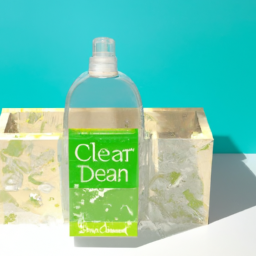
When you use Dawn dish soap, it’s important to consider how you dispose of the packaging and manage the waste. While the dish soap itself may be effective and environmentally friendly, the packaging can have a significant impact on the environment if not handled properly.
One way to reduce the environmental footprint of Dawn dish soap packaging is by exploring alternative options. For example, instead of purchasing regular-sized bottles, you can opt for larger refill packs or concentrate formulas that require less packaging material. These alternatives help minimize plastic waste and are often more cost-effective in the long run.
Furthermore, recycling programs play a crucial role in managing the waste generated from Dawn dish soap packaging. Many municipalities offer curbside recycling services where you can separate and recycle materials like plastic bottles or cardboard boxes. It’s important to check with your local recycling program to understand what specific types of plastic are accepted.
Additionally, some retailers also participate in take-back programs where you can return empty Dawn dish soap containers for proper recycling or reuse. These initiatives contribute to reducing landfill waste and promoting a circular economy.
Dawn Dish Soap’s Biodegradability and Water Pollution
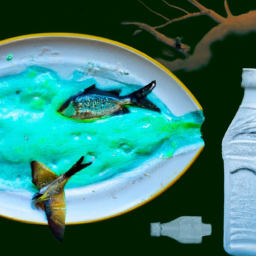
Using alternative dish soaps can be a more sustainable choice, as they are often biodegradable and help prevent water pollution. Biodegradability testing is an important aspect of determining the environmental impact of dish soaps. Environmental regulations require manufacturers to conduct biodegradability tests to ensure that their products break down naturally in the environment.
These tests assess the ability of a dish soap’s ingredients to decompose into simpler substances by microorganisms found in soil, water, and air. The results determine whether a product can be classified as biodegradable or not. Dish soaps that pass these tests are considered environmentally friendly because they do not accumulate in aquatic ecosystems and harm marine life.
Dawn dish soap is one such brand that has undergone rigorous biodegradability testing. It has been shown to break down rapidly, making it less likely to cause harm to the environment. This makes Dawn an appealing choice for individuals looking for eco-friendly alternatives.
Dawn Dish Soap’s Impact on Wildlife and Ecosystems
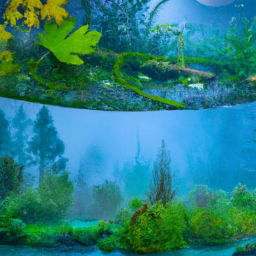
Opting for biodegradable dish soaps can help protect wildlife and maintain the balance of ecosystems. When you choose biodegradable dish soaps like Dawn, you are making a conscious decision to support wildlife conservation and ecosystem preservation. The impact of conventional dish soaps on wildlife and ecosystems is significant. These products often contain harmful chemicals that can persist in the environment, polluting waterways and endangering aquatic life.
Studies have shown that the chemicals found in non-biodegradable dish soaps can be toxic to marine organisms such as fish, amphibians, and crustaceans. When these chemicals enter water bodies through wastewater runoff, they accumulate in the food chain, causing long-term damage to biodiversity.
Biodegradable dish soaps like Dawn are designed to break down quickly into harmless substances when exposed to natural processes such as sunlight, bacteria, and air. This ensures that they do not accumulate in the environment or pose a threat to wildlife.
Dawn Dish Soap’s Sustainability Initiatives and Certifications
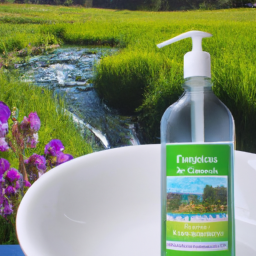
If you want to support sustainable practices, look for dish soaps that have obtained recognized certifications. One such brand is Dawn Dish Soap, which has made significant efforts in sustainability initiatives and has obtained several certifications. Dawn sources its ingredients sustainably, ensuring that they are responsibly and ethically acquired. They prioritize community partnerships by working with local farmers and suppliers who follow sustainable practices.
Dawn Dish Soap has partnered with organizations like the Marine Stewardship Council (MSC) to ensure that their products do not contribute to overfishing or harm marine ecosystems. This certification guarantees that the fish oils used in their dish soaps come from sustainable sources. Additionally, they have collaborated with Rainforest Alliance to promote responsible sourcing of palm oil, a common ingredient in many cleaning products.
Comparing Dawn Dish Soap With Other Eco-Friendly Dish Soaps
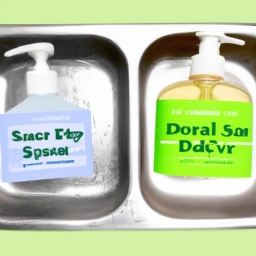
When comparing different brands, you’ll find that some dish soaps are more environmentally conscious than others. One popular brand that stands out in terms of effectiveness and eco-friendliness is Dawn Dish Soap. Many people wonder if this well-known brand can remove tough stains without harming the environment. The answer is yes.
Dawn Dish Soap has been trusted by millions for its ability to tackle even the toughest grease and grime on dishes, pots, and pans. It is formulated with powerful ingredients that cut through grease effectively. However, what sets Dawn apart from other dish soaps is its commitment to environmental sustainability.
In comparison to other eco-friendly dish soaps, Dawn offers a competitive pricing range. While prices may vary based on specific retailers and locations, Dawn generally offers affordable options for consumers who prioritize both effectiveness and sustainability.
Not only does Dawn effectively remove tough stains, but it also takes steps to minimize its environmental impact. The brand has made efforts to reduce waste by using recycled plastic in their packaging and supporting wildlife conservation organizations through their "Dawn Helps Save Wildlife" campaign.
Overall, when comparing pricing between Dawn Dish Soap and other eco-friendly options, you can trust that Dawn provides an effective solution for removing tough stains while being mindful of the environment at an affordable price point.
Tips and Alternatives for Eco-conscious Dishwashing
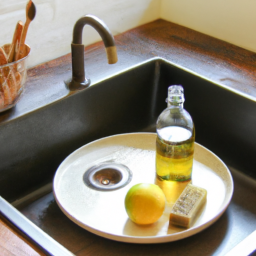
Looking to be more environmentally conscious while washing your dishes? Consider using alternative methods, such as homemade natural cleaners or reusable dishcloths. Eco-friendly dishwashing not only reduces your carbon footprint but also promotes a healthier home and planet. One effective way to achieve this is by opting for green cleaning products that are free from harmful chemicals and toxins.
When it comes to eco-friendly dishwashing, homemade natural cleaners can be a great option. You can easily make your own cleaner using ingredients like vinegar, baking soda, and lemon juice. These natural ingredients are not only safe for the environment but also gentle on your skin.
Another alternative is to use reusable dishcloths instead of disposable ones. By choosing reusable options made from sustainable materials like bamboo or organic cotton, you can significantly reduce waste and contribute to a greener lifestyle.
Additionally, look for eco-friendly dishwashing detergents that are biodegradable and phosphate-free. These products break down quickly in water without causing harm to aquatic life or polluting our waterways.
Frequently Asked Questions
Can Dawn Dish Soap Be Used for Purposes Other Than Dishwashing?
Dawn dish soap can be used for more than just washing dishes. It has many other household cleaning uses. You can use it to clean greasy stovetops, remove tough stains from clothing, and even as a gentle cleaner for your pets. While there are alternative eco-friendly dishwashing soaps available, Dawn is known for its effectiveness in cutting through grease and grime. So if you’re looking for a versatile cleaning solution, Dawn dish soap is worth considering.
Are There Any Specific Safety Precautions to Consider When Using Dawn Dish Soap?
When using Dawn dish soap, it’s important to keep safety precautions in mind for proper usage. Always follow the instructions on the label and avoid contact with your eyes. If accidentally ingested, seek medical attention immediately. Keep out of reach of children and pets to prevent accidental ingestion or injury. Additionally, be cautious when using near aquatic environments as some versions may contain ingredients harmful to aquatic life. Taking these safety measures can help ensure a safe and effective experience with Dawn dish soap.
Does Dawn Dish Soap Contain Any Harsh Chemicals That Can Harm the Environment?
Dawn dish soap ingredients and their impact on marine life are important to consider. Some people may wonder if the chemicals in Dawn can harm the environment. While it is common knowledge that Dawn is effective at cutting through grease, it’s also worth noting that it contains surfactants and enzymes that are biodegradable. This means they break down easily in water and pose minimal harm to aquatic life. So, when using Dawn, you can have confidence that you’re making an eco-friendly choice.
How Long Does It Take for Dawn Dish Soap to Biodegrade in Water?
In biodegradability testing, it has been found that Dawn dish soap can break down in water within a short period of time. This means that it doesn’t linger in aquatic environments for long, minimizing its impact on marine life. The quick biodegradation of Dawn dish soap is an important factor to consider when evaluating its eco-friendliness. Its ability to degrade rapidly helps protect the health and well-being of aquatic organisms.
What Are Some Tips for Reducing Water Usage While Using Dawn Dish Soap for Dishwashing?
When it comes to reducing water usage while using dish soap, there are a few tips you can follow. Firstly, make sure to scrape off excess food from your dishes before washing them to minimize the amount of water needed. Secondly, consider using eco-friendly alternatives to Dawn dish soap that require less water for rinsing. These alternatives are formulated with biodegradable ingredients and can help you conserve water while still getting your dishes clean.
Conclusion
In conclusion, if you are looking for an eco-friendly dish soap option, Dawn Dish Soap may not be your best choice. The ingredients used in the soap can have negative environmental effects, and its packaging and waste management practices are not the most sustainable. Additionally, the biodegradability of Dawn Dish Soap raises concerns about water pollution and its impact on wildlife and ecosystems. While Dawn has made some sustainability initiatives, there are other dish soaps available that are more environmentally friendly. Consider exploring alternative options for a more eco-conscious dishwashing experience.